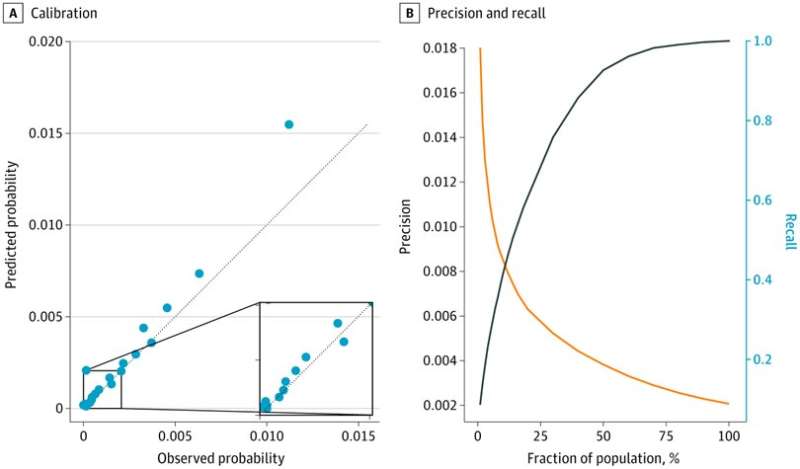Researchers use AI to predict risk of developing type 2 diabetes

Artificial intelligence could be used to predict who is at risk of developing type 2 diabetes—information that could be used to improve the lives of millions of Canadians.
Researchers at the University of Toronto used a machine learning model to analyze health data, collected between 2006 to 2016, of 2.1 million people living in Ontario. They found that they were able to use the model to accurately predict the number of people who would develop type 2 diabetes within a five-year time period. The machine learning model was also able to analyze different factors that would influence whether people were high or low risk to develop the disease.
The results of the study were recently published in the journal JAMA Network Open.
"We know that identifying people who are at risk of developing type 2 diabetes is really important because there are things we can do to prevent the onset of the disease," says senior author Laura Rosella, an associate professor in the University of Toronto's Temerty Faculty of Medicine and the Dalla Lana School of Public Health.
"This machine learning model can help with managing one of the biggest chronic disease challenges in North American society. There is a demonstrated advantage to intervening early when people are at risk of type 2 diabetes."
Rosella, who is the education lead for the Temerty Centre for AI Research and Education in Medicine (T-CAIREM), says the study's findings could help inform larger health system strategies to decrease the number of people who develop type 2 diabetes.
"The model is about 80 percent accurate when it comes to predicting who will develop type 2 diabetes," she says. "By using this information in a proactive way, we can plan health systems better and help prevent what can be a serious, burdensome condition."
The use of a machine learning model is important, says Rosella, because it shows how routinely collected data can be used to address complex health problems in a more effective way.
Preventing type 2 diabetes means looking at larger structural factors like food insecurity and access to primary care physicians, Rosella adds.
"We know diabetes can be prevented or delayed. We know there are effective ways we can prevent the onset of a chronic disease. This study offers a way to start thinking about how to identify who is at risk of type 2 diabetes, and then start implementing strategies to stop the onset of a debilitating, lifelong condition."
Vinyas Harish, an MD-Ph.D. candidate at the Temerty Faculty of Medicine and learner co-lead at T-CAIREM, says the research illuminates how scrutinizing social determinants of health have an important impact on stopping the spread of type 2 diabetes.
"It helps us think about what we can do to get a health system to intervene on larger, more structural factors," he says.
Rosella says medical research that incorporates artificial intelligence requires a team approach.
"You need a multi-disciplinary group of people that include a group of really good computer scientists, people that understand data and how to use it, and people with a health-system perspective and a clinical perspective," she says.
"This is needed to make sure that you're coming up with algorithms that are actually going to be used and have an impact."
More information: Mathieu Ravaut et al, Development and Validation of a Machine Learning Model Using Administrative Health Data to Predict Onset of Type 2 Diabetes, JAMA Network Open (2021). DOI: 10.1001/jamanetworkopen.2021.11315




















